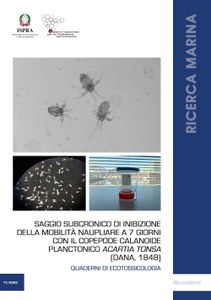Subchronic assay of naupliar mobility inhibition at 7 days with the planktonic calanoid copepod Acartia tonsa (Dana, 1948)
Ecotoxicology booklet
Here, the subchronic assay regarding the inhibition of naupliary mobility, after 7 days, with the planktonic calanoid copepod Acartia tonsa, is described. The protocol is included in the Technical Annex of the Ministerial Decree no. 173 of 15 July 2016 "Regulation containing modalities and technical criteria for the authorisation of the immersion in the sea of seabed excavation materials” as an alternative to other ecotoxicological assays to be performed on liquid phase.
This protocol is easier to be performed than the one indicated in UNICHIM 2366 and derives from the skills and experience gained by the technical-scientific group of the "Section for the assessment of ecological risk in marine-coastal environments" of ISPRA Livorno, which was supported by other public and private bodies that suggested some modifications during the drafting process.
In addition, this “Quaderno”, like the previous, contains some useful suggestions and updates for the breeding and maintenance of the copepod A. tonsa, as well as some specific technical-scientific details related to the preparation of the algal cultures needed to feed this species.
The aim of this text is to facilitate the achievement of a good level of the executive autonomy of the operators, allowing the start of intercomparison/intercalibration tests, in order to define a national control map within SNPA. The large-scale experimentation of this bioassay and its application in different territorial contexts will be the basis for periodic updates of this “Quaderno”, which will be also supported by the increasing knowledge on the biology of the test organism A. tonsa.
Publication available only online
Download the publication (pdf - 3,3 mb)

